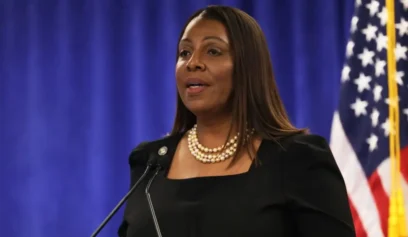Lawmakers in the Atlanta suburb of Lilburn, Georgia, unanimously voted this month to temporarily ban new small-box retail stores. The move has several Black business owners concerned and the president of the Gwinnett County Black Chamber of Commerce calling the measure racist.
“This is all still part of the gentrification playbook, I’m even going to say white supremacy, racist playbook,” said Cheryle Moses, president of the Gwinnett County Black Chamber of Commerce.
Moses is upset the Lilburn City Council voted to place a temporary ban on nondescript small-box establishments that are 6,000 square feet or less in size. The ban will be in effect until Dec. 31, 2022. The businesses in question can include convenience stores, dollar stores and hobby shops.
Moses believes new Black-owned businesses will feel the brunt of the new direction the city is taking.
“Black businesses and other minority businesses will definitely be affected by that 6,000 square feet, that’s a huge footprint,” said Moses.
When asked why the city went in this direction, Lilburn Assistant City Manager Jenny Simpkins told Atlanta Black Star the city is growing, and with that growth comes the need to attract more businesses. The city hired Retail Strategies, a retail recruitment agency, to help analyze the current retail landscape. The agency found Lilburn had an “over-abundance of non-descript ‘small box retail,’” many of which can be found along US 29.
Simpkins also noted that the city wants to attract high-end businesses, and this desire also raises concerns among the Black business community.
“If you’re talking about stores that the residents here can’t afford, you’re targeting new residents or you’re trying to bring other people in. That’s still bad for residents here who want to open businesses here,” said T.L. Lewis, owner of Baby Al’s.
Lewis owns the small restaurant along Indian Trail Road in Lilburn specializing in hotdogs and sandwiches. His business is located within a strip mall where he has operated for six years. He is concerned where the temporary ban could lead to down the road.
“You’re basically taking away from people’s earning, especially during this time. A number of people I know couldn’t go back to work and they took savings, and they went into doing what it is they love. That’s what I did and I’m doing something what I love for the rest of my life,” Lewis said.
Many of the nondescript businesses can be found in strip malls throughout the city. Existing businesses are exempt from the new ban, as well as restaurants and service establishments.
Cedric Boykins owns the Fade Factory barbershop located in the same strip mall as Lewis’ restaurant. Even though Boykins won’t be directly impacted by the new temporary ban, he too is concerned about the long-term impact on Black consumers in the city, which make up 16 percent of the city population, according to latest Census data.
“For that 20 percent to 16 percent, they need somewhere where they can go and feel comfortable and see their own kind, so it makes it even harder,” Boykins said.
Simpkins also tells Atlanta Black Star the city has not received any negative feedback on the temporary ban, but that may soon change if Moses and the Gwinnett Black Chamber have their way.
“I hope they are getting ready because they will be getting some negative response about it,” said Moses.
There was no public hearing on the ban proposal before its unanimous vote by the City Council.


